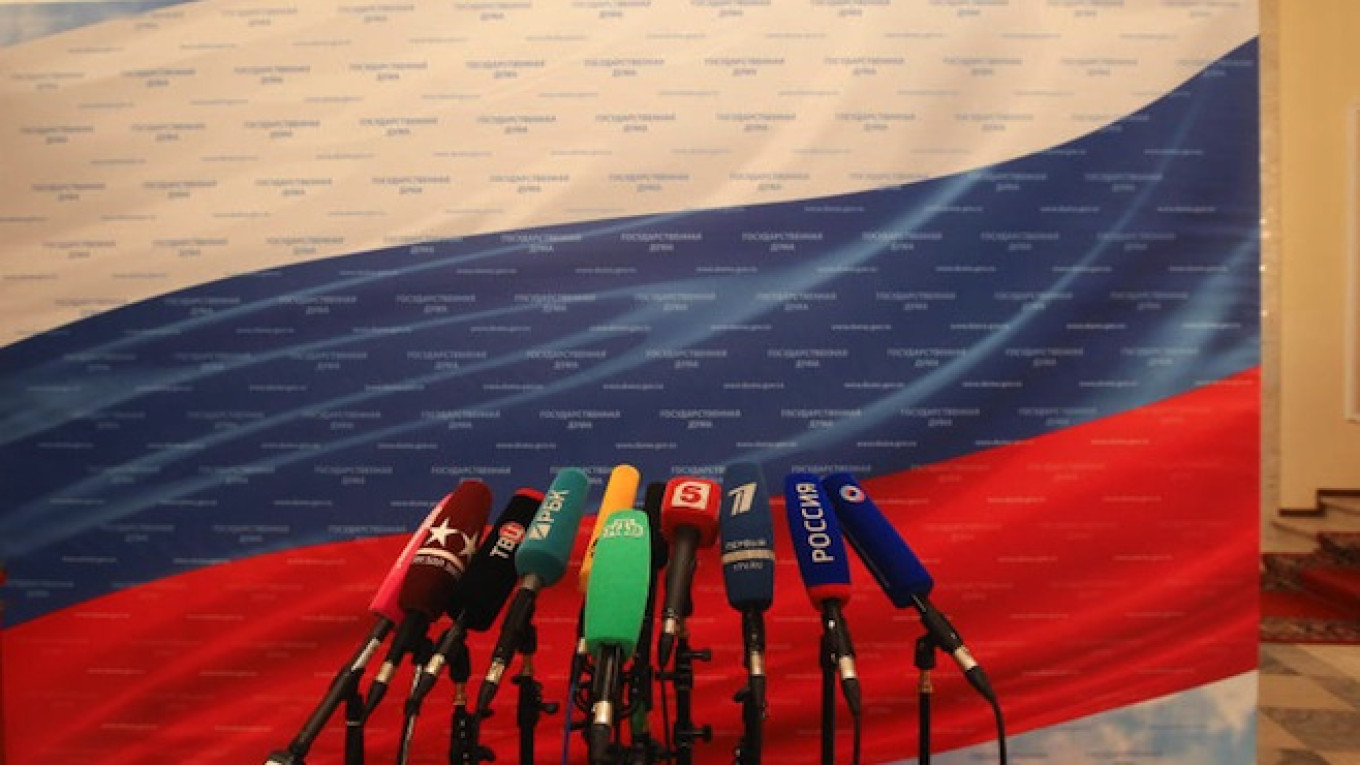The Democratic Republic of Congo — where 61 newspapers, five radio stations and a television station have been shut down by the government and several journalists have been arbitrarily arrested in recent months — is presently more successful in guaranteeing the freedom of the press than Russia, Reporters Without Borders revealed Thursday.
"Russia's current rank is the result of the growing repression of the past few years," Johann Bihr, head of the organization's Eastern Europe and Central Asia Bureau, told The Moscow Times on Thursday. "The tipping point has been the crisis in Ukraine, which has reinforced the paranoia and hysteria that have led independent media outlets to be considered a fifth column."
Between 2012 and 2014, Russia placed 148th in the list, which ranks countries' performances in the areas of media pluralism and independence, respect for journalists' safety and freedom, and media-related legislation, among other criteria.
Although Russia currently boasts a lower press freedom ranking than many countries with controversial rights records, it scored well above others, such as North Korea, Iran and Belarus.
Russia's dive in the 2015 list is thought to be linked to the Ukraine crisis. "While Russia's leading television channels continue to inundate viewers with propaganda, the Ukrainian crisis led to an increase in pressure on independent media, with a string of draconian laws, website blocking and leading independent news outlets either being brought under control or throttled out of existence," Reporters Without Borders said in a statement accompanying the new ranking.
"The climate has become very oppressive for those who question the new patriotic and Neo-Conservative discourse and, in some regions, local despots have taken advantage of this new climate to step up their persecution of critics," the statement added.
Pressure on independent media outlets is being felt across the country, according to Reporters Without Borders.
Siberian independent television station TV-2, which had operated since the collapse of the Soviet Union, stopped its cable broadcasts earlier this week after it was stripped of its license.
Dozhd independent television channel was forced to move their studio to a private apartment in December to continue its work after an abrupt eviction. The channel moved to professional studio on Monday.
Last March, the editor-in-chief of liberal-leaning Lenta.ru, Galina Timchenko, was fired and replaced by Alexei Goreslavsky, the former editor of pro-Kremlin news website Vzglyad.ru. Timchenko and a portion of the staff of Lenta.ru moved to Riga and founded Meduza, a news site geared toward the Russian public that is strategically beyond the Russian state's jurisdictional reach.
Other former Soviet republics have also fallen in the index. Ukraine dropped two slots to the 129th position after six journalists were killed in the line of duty last year. Azerbaijan likewise fell from 160 to 162 because of an official campaign of "silencing the few remaining independent voices that it has not already managed to suppress," according to Reporters Without Borders.
As for the Democratic Republic of Congo's comparatively high ranking of 150, Reporters Without Borders said in a statement: "DRC's one-place rise in the index was due solely to other countries falling in a year marked by a worldwide decline in respect for media freedom."
A Message from The Moscow Times:
Dear readers,
We are facing unprecedented challenges. Russia's Prosecutor General's Office has designated The Moscow Times as an "undesirable" organization, criminalizing our work and putting our staff at risk of prosecution. This follows our earlier unjust labeling as a "foreign agent."
These actions are direct attempts to silence independent journalism in Russia. The authorities claim our work "discredits the decisions of the Russian leadership." We see things differently: we strive to provide accurate, unbiased reporting on Russia.
We, the journalists of The Moscow Times, refuse to be silenced. But to continue our work, we need your help.
Your support, no matter how small, makes a world of difference. If you can, please support us monthly starting from just $2. It's quick to set up, and every contribution makes a significant impact.
By supporting The Moscow Times, you're defending open, independent journalism in the face of repression. Thank you for standing with us.
Remind me later.


